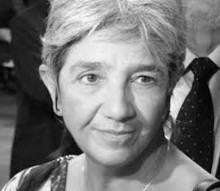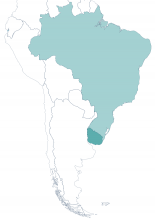Lilián Celiberti was born in Montevideo on 3rd December 1949. At 16 years old, she embarked on a teacher training course. This experience brought Lilián and many of her contemporaries closer to the reality of poverty and social exclusion. She joined a socio-pedagogical group linked to rural schools and became involved in the student assembly at her teacher training centre.
In 1972, Lilián joined the Federación Anarquista Uruguaya (Uruguayan Anarchist Federation, FAU) while working at a state school in the Cerro neighbourhood of Montevideo. That year, an increasingly authoritarian democracy was taking root under the government of Pacheco Areco. During this political context, Lilián endured her first arrest and was held for two months in the Carlos Nery Nursing School, which was turned into a secret prison. She was arrested by the military again in 1973 and initially detained in the barracks. Lilián was later tried by the military courts and incarcerated for a year and a half in the Punta de Rieles prison.
Upon her release, Lilián was forced into exile with the provision that she was not allowed to live in any country in the region. For this reason, Lilián went to Italy, where she became involved in the feminist movement and began her studies at the University of Milan. Meanwhile, she remained connected to the efforts of Uruguayan exiles in Europe who were denouncing the military dictatorship.
In 1976, she became a member of the Partido por la Victoria del Pueblo (Party for the Victory of the People, PVP). The PVP was formed in Buenos Aires in 1975 and brought together militants from different Uruguayan anarchist groups.
In 1978, Lilián moved to the Brazilian city of Porto Alegre with her partner and Uruguayan writer, Universindo Rodríguez, and her two children. During her first year in Brazil, she became an editor of the PVP magazine, Compañero, which was smuggled into Uruguay. The publication denounced the disappearances, assassinations, torture, and corruption of the Uruguayan dictatorship. It also sought to strengthen ties with the opposition to the Brazilian dictatorship and support the international campaign for the Uruguayans who were disappeared in Argentina throughout 1976.
In November 1978, a group of Brazilian and Uruguayan police and military officers kidnapped Lilián and Universindo along with seven-year-old Camilo and three-year-old Francesca. The operation code-named 'broken shoe' (zapato roto) was a coordinated effort involving the Compañía de Contrainformación del Ejército (the Uruguayan Army's Counter-Information Company) and the Brazilian Departamento de Ordem Político e Social (Department for Political and Social Order, DOPS).
Lilián was captured in a bus station at Porto Alegre while Universindo and the children were apprehended as they were leaving their flat. They were first detained and tortured in the DOPS building and later secretly transferred to Uruguay with the children.
The Uruguayan militants, Glauco Giannone and Eduardo Ferro, entered the grounds of the Santa Teresa National Park in the Rocha Department of Uruguay and immediately took over Lilián's torture and interrogation. She was soon separated from her children, who were transferred to Montevideo. Lilián's mother travelled from Italy to Brazil during the following days. She began to publicly denounce what had happened and made the security officers return her grandchildren.
Lilián was returned to Porto Alegre. The officers used death threats against her children to force her to identify or contact other militants. On 17th November 1978, the head of Veja magazine in Porto Alegre, journalist Luiz Cláudio Cunha, received an anonymous phone call pleading for him to go to a flat on Botafogo Street. When Cunha and the photographer, João Baptista Scalco, knocked on the door, a terrified young woman who they recognised as a Uruguayan militant met them.
The journalists started an investigation and media campaign to denounce the operation. Their actions were key to piecing together the events and identifying those responsible. That night, Lilián was returned to the DOPS before being transferred to Montevideo.
A week later, the Ministry of Public Relations released an official communiqué stating that Lilián and Universindo had been detained for illegally entering Uruguay while carrying arms and subversive materials.
Lilián was detained in various Uruguayan barracks. She was later prosecuted by the military courts and held as a political prisoner at the penitentiary of Punta de Rieles until 21st November 1983.
In May 1980, a soldier who had deserted the Compañía de Contrainformación del Ejército (Uruguayan Army's Counter-Information Company) internationally denounced the planning and masterminds behind the operation.
In March 1979, the lawyer, Omar Ferri filed an allegation before the Brazilian criminal justice system and established a parliamentary commission to investigate the case.
In 1980, the parliamentary and judicial investigations of the case unfolded. The judicial inquiry led to the Brazilian police officer, Orandir Portassi Lucas being sentenced on appeal for the offence of the abuse of authority.
On 23rd February 1984, Lilián and Universindo filed a criminal lawsuit before the Uruguayan courts denouncing their hostage, while the country remained under the dictatorship. In May 2018, the courts ordered the prosecution of four of the Uruguayan officers involved in the operation.



